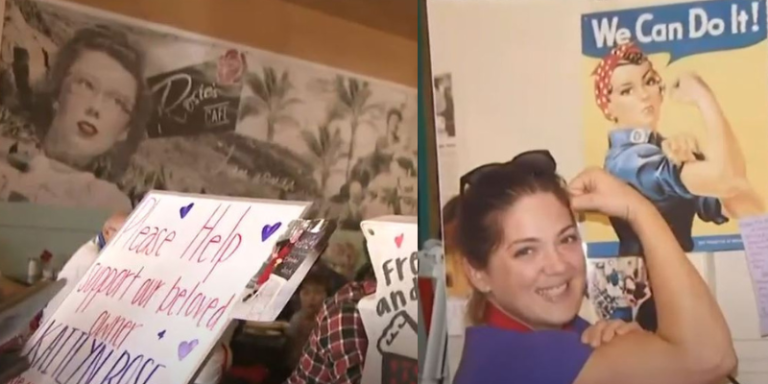Rosie’s Cafe was more than just a vintage diner tucked away in Escondido; it was Kaitlyn Pillsbury’s dream come true. However, the vision was obscured by oil-stained floors, mismatched décor, and a daily battle for survival by the time Restaurant: Impossible arrived. Despite her unquestionable passion, Kaitlyn was navigating the hospitality industry without a crew, a map, or a compass. She hadn’t paid herself in two years, the business was losing money, and there was a noticeable chaos, from uncontrollably high food expenses to service hiccups.
The energy changed like a chef tossing up a pan of stir-fry on fire when Robert Irvine took over. He identified a bruised ambition in addition to a broken kitchen. He destroyed Rosie’s and rebuilt it, not only physically but also emotionally, with his extraordinarily productive team. Soon after, a mural of Kaitlyn’s grandmother, Rosie, was painted on the wall to pay tribute to the woman who gave the cafe its name. The operational overhaul was the most significant change, even though the aesthetic adjustments were stunning. The cost of food was recalculated. The definition of roles was changed. Jason, Kaitlyn’s ex-boyfriend who is now a head chef, received invaluable culinary instruction that significantly enhanced kitchen efficiency.
Rosie’s Cafe – Quick Facts
| Attribute | Details |
|---|---|
| Restaurant Name | Rosie’s Cafe |
| Show Featured On | Restaurant: Impossible (Season 14, Episode 1) |
| Location | 117 W. Grand Avenue, Escondido, California |
| Owner | Kaitlyn Rose Pillsbury |
| Opening Year | 2016 |
| Key Issues | Financial mismanagement, poor operations, inexperience |
| Major Transformation Date | January 2019 |
| Follow-Up Fundraiser Event | Carnival on February 17, 2020 |
| Total Raised for Kaitlyn | $118,549 (Food Network: $50K, Irvine: $20K, Public: $48K) |
| Closure Date | June 2020 |
Kaitlyn’s Carnival: When Community Turns Into Family
Amazingly, tragedy struck only a few months after Rosie’s rebirth. Kaitlyn was riding her motorcycle when she was struck by a careless SUV driver on December 21, 2019, leaving her unconscious, severely injured, and in debt from medical bills. This would have been the end of the road for many. It became the beginning of something incredibly human for Kaitlyn.
Irvine organized a large-scale carnival fundraiser along Grand Avenue by taking advantage of the show’s popularity and audience. It was more than just a community gathering; it was a televised ode to resiliency, complete with East Coast food vendors, games, and a VIP dinner. By raising more than $118,000, the initiative was able to pay for necessary medical expenses and show how TV magic can be turned into actual miracles. The Restaurant: Impossible team once again exceeded expectations through strategic alliances and individual kindness.
A Sobering Reality of Small Business Life: The Closure of the Diner
In June 2020, Rosie’s permanently closed despite the support. Small restaurants like Rosie’s, which were already overcrowded, suffered greatly during the pandemic. The fate of many small businesses during those months is remarkably similar: doors are locked, phones are disconnected, and dreams are put on indefinite hold.
However, Kaitlyn’s spirit was remarkably intact. “Thank you. “I’m alive,” she declared from her hospital bed, delivering a statement more impactful than any dish on the menu. The poignant moments created during those trying years were not erased by the heartache of closure. If anything, they served as evidence that some endeavors, even if they are short-lived, have a greater influence than years of modest success.
Irvine’s Last Remark: Not Just Tearing Down, But Teaching
Although Robert Irvine has always exuded strength, Rosie’s defied that expectation. The episode emphasized his humanity in addition to showcasing his culinary leadership. One thing became very evident as he sat next to Kaitlyn’s hospital bed, laughing with her and wiping away her tears: the show wasn’t just about turning failing restaurants around. The goal was to change people’s lives.
Through intense mentoring, sincere support, and unvarnished candor, Irvine helped Kaitlyn develop into a more resilient businesswoman and a representation of fortitude in the face of adversity. Despite being closed, Rosie’s Cafe served as a symbol of what can happen when a community comes together.
The Legacy: It Was Our Story, Not Just a Diner
Rosie’s Cafe was a deeply poignant chapter in the greater story of American tenacity, not a failure. Rosie’s was both a cautionary tale and an inspiration to every small-town diner that was barely surviving. Innovative community models, such as the carnival fundraiser, demonstrated that when people are emotionally invested, assistance can come from unexpected sources.
Many more businesses will probably be attempting to strike a balance between ambition and hardship, as well as dreams and debt, in the years to come. Few places, however, will be as profoundly remembered as Rosie’s—a place that was changed not only by new tabletops and tiles but also by love, tenacity, and the unwavering conviction that some stories are worth rewriting, even if they end too soon.



